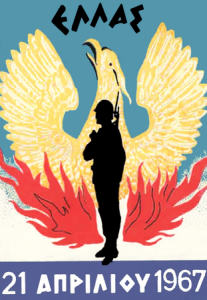- Radio Station of Athens, the child of Ioannis Metaxas
- War and Occupation
- Post-War – Television
- The Military Junta
- Papandreou: “Change!”
- Summer of 1987 – Basket Ball Champion
- Diversification of broadcasting
It was 19 July 2013.
Following a tough two-day discussion and voting on the bill issued by the Ministry of Finance to fulfil the Troika’s demands regarding the new tax code, the mobility of public servants and the lay-offs in the public sector, it was time for the Greek Parliament to vote on the bill for the new Greek public broadcaster. The new corporation with the temporary name “NERIT” (New Greek Radio Internet Television) was designed as the official successor of ERT. In a tense session that continued the polarization between the government and the opposition parties, the bill finally passed in Parliament with a total of 155 out of 300 votes.
Historians of the future will mention this day as the tombstone for ERT, whose life had ended suddenly on 11 June 2013 after almost 75 years of history.
Stepping out of the parliamentary press zone that day, I was clearly in a nostalgic mood.
I returned home and literally dived into my library.
Radio Station of Athens, the child of Ioannis Metaxas
It wasn’t long before I realized Ι had travelled back in time.
The date was 25 March of 1938. It was the Greek National Day, celebrating the declaration of liberation of Greece from the Ottoman Empire Occupation in 1821.
The National Garden in the centre of Athens near Syntagma Square was filled with people hanging around on the occasion of the national holiday. In one of its areas, though, around and inside the famous Zappeion Megaron building everybody was working in such a hurry that it attracted the curiosity of the passers-by.
A few minutes later, a strange voice heard through the loudspeakers hung outside the Zappeion Megaron started addressing the Greek people with a message dedicated to the National Day. It took them a while to realize that the man behind that voice was King George the Second and that this was the first time they were able to hear him from a distance.
This speech happened to be the birth moment of ERT, the Hellenic Broadcasting Corporation.
It was recorded in history as the first programme of the Greek state-owned broadcaster and also as the first transmission from abroad in Greece.
This unique moment was the result of efforts by an ingenious yet controversial political persona of that time, the dictator Ioannis Metaxas. Born in an aristocratic yet decadent family, Ioannis Metaxas had managed to survive a difficult financial family situation and join the Army Engineering School. Being a witty and strategic mind in a period of continuous wars, Metaxas climbed up quickly in the Army hierarchy. During the war between Greeks and Turks in 1897, he befriended Crown Prince Constantine and thus won the favour of the King who awarded him with a scholarship to complete his studies in Germany.
It was there that Metaxas encountered the German spirit and became fond of Prussian military tactics, strategies and methodology.
Years passed by, in which the restless Metaxas slowly but effectively transformed himself from a cold-blooded military officer to a ruthless politician. The climax of his ambitions came in 1936, when he organized a military coup and established a dictatorship known as “the Regime of 4th August”.
From the first moment of his despotism, the German-educated dictator tried to incorporate Hitler’s methodology of crowd control. So, except for the typical characteristics of a dictatorship (police brutality, persecution of opposition politicians, establishment of a regime youth club, restriction of the freedom of press), he insisted on developing a cultural environment supportive of the regime.
He named it “The Third Greek Civilization” (counting the Ancient Greek Civilization as the first and the Byzantine Empire Civilization as the second) and developed a series of cultural activities to promote his concept. Part of these activities was the establishment of the first state radio broadcaster.
In the context of the events described above, the radio broadcaster came on air for the first time on 25 March 1938, and its official opening was announced in May 1938.
It was called “Radio Station of Athens”.
It was a project undertaken and technically developed by the German corporation Telefunken. The first radio transmitter was established in Liossia, an eastern district of Athens and its studios were located in Zappeion Megaron, inside the National Garden area.
A committee of the most acknowledged musicians of that time, chaired by the famous maestro Georgios Lykoudis chose the jingle that would mark all ERT’s programmes from now on: “Tsopanakos” (translated as “young shepherd”), a music piece that brings tears to the eyes of the older Greeks raised with ERT’s programmes.
It was then I realized I needed a break from reading. I selected the song “Tsopanakos” on my laptop and went to grab something to drink.
[iframe width=”100%” height=”166″ scrolling=”no” frameborder=”no” src=”https://w.soundcloud.com/player/?url=http%3A%2F%2Fapi.soundcloud.com%2Ftracks%2F96726529″ style=”margin-right:10px; float:left; border-right: 40px solid #0d5eaf”]
War and Occupation
A few minutes later, almost midnight, I was back in my time travel reading.
In a perfect sense of timing, the first information that drew me into the ERT history again, was the fact that in those early days the programmes were broadcast only at night due to financial and practical reasons. At that time, Athens’ population was nearly half a million, of whom all in all 500 owned one of the expensive radio receivers.
The content of those first broadcasts was purely propagandistic. Metaxas used his creation to make the audience sympathize with his regime and the Greek Palace. Despite this fact, though, Athenians loved the new medium and it started spreading very quickly.
It all changed on 28 October 1940.
The warm voice of radio speaker Kostas Stavropoulos announced:
[iframe src=”//www.youtube.com/embed/yEIhMzVhXac?rel=0″ width=”320″ height=”180″ style=”margin-left:10px; border-right: 40px solid #0d5eaf ; float: right;”]
“You are listening to the Radio Station of Athens. We are transmitting the first bulletin by the Greek Army Headquarters: From 05.30 this morning, the Italian troops are attacking our military positions on the Greek-Albanian border. Our own forces are defending our homeland.”
And then the war started.
A war in which Greeks tried to defend the country’s independence from Italians and Germans.
It was during that war that the Radio Station of Athens was transformed from a station fully controlled by the dictatorship to a state broadcaster starting to represent the nation’s voice, agonies and hopes. Its mission was to inform the Greeks about the battles’ outcomes and the army’s victories and losses, as well as to encourage Greek soldiers and families to keep fighting.
[iframe src=”//www.youtube.com/embed/SUWIwsZOUU0?rel=0″ width=”320″ height=”180″ style=”margin-right:10px; border-left: 40px solid #0d5eaf ; float: left;”]
One of the most legendary moments of those days was the broadcasting of the then infamous war song “Koroido Mussolini” (literally translated “Mussolini fool”), a satirical composition against Italian troops, written by Giorgos Oikonomides (who became a radio star in the following years) and performed by Sofia Vempo.
Another important activity of the Radio Station of Athens at that time was the re-transmission of the signals of the BBC and the Cairo state broadcaster that kept the Greek population informed about international events.
On 27 April of 1941, the German Army occupied Athens.
The voice of Kostas Stavropoulos was heard again, but this time dramatic like that of the protagonist in an ancient Greek tragedy:
[iframe src=”//www.youtube.com/embed/6OzDULZRyHA?rel=0″ width=”320″ height=”180″ style=”margin-left:10px; border-right: 40px solid #0d5eaf ; float: right;”]
“Here is free Athens calling. Greeks, the German invaders are at the outskirts of Athens. Brothers, keep firmly in your soul the spirit of the front-line. The invader is entering the deserted city with all precautions. Greeks, keep your hearts high. Caution! The Radio Station of Athens, in a few moments, will no longer be Greek. It will be German, and it will broadcast lies. Greeks, do not listen to them. Our war will continue, and it will be continued until the final victory. Long live the nation of the Greeks.”
A few hours later, the Radio Station of Athens was occupied by German troops.
This was the only time in its history before 11 June of 2013 that the Greek state broadcaster had been shut down.
In the months that followed, the German occupation army seized all private broadcasters and cut off the transmission of BBC and the Cairo state broadcaster.
The broadcasts from now on were dedicated to German propaganda, consisting of German and Spanish music (the latter because the Spanish dictator Franco was a German ally) and German language lessons.
In August 1944, in a unique resistance action, Dinos Tsaloglou, one of the journalists working at the German-occupied radio station, grabbed the microphone and called out to his fellow countrymen:
“Long live Hellas. Long live EAM (National Liberation Front, the main national resistance organization, founded by the Greek Communists). Hit the Germans. They are leaving soon. Greece will be a free country soon.”
Indeed.
Two months later, in October of 1944, the German Army left Athens. In revenge, they blew up the antenna of the Liossia radio transmitter. The damage was severe and it took the Greek State a while and part of the war reparations in order to repair it.
Post-War – Television
On 16 July 1945, the state radio broadcaster came back on air. Renewed and completely restructured after the liberation, it was now named EIR (Greek/Hellenic Radio Foundation).
Among its first directors were two important Greek authors: the novelist Stratis Myrivilis and the Nobel Prize-awarded poet Odysseas Elytis. In the years that followed, under their inspiring management EIR was blooming. Within a decade, the number of radio stations increased to three, broadcasting nation-wide.
A series of influential programmes was developed. From the legendary “Theia Lena” (translated as “Aunt Lena”), a very popular children’s show, to numerous radio series, theatre adaptations and cultural news. Meanwhile, the experience of EIR staff in news and sports coverage significantly improved.
EIR was already an important and powerful state broadcaster. Subsequently, it became one of the 23 founding members of the European Broadcasting Union (EBU) in 1950.
It was only a matter of time for the television era to arrive.
The kick-off moment was the passage of Law 1663/1951 in 1951, allowing the establishment and operation of TV and radio stations by the Army Forces. For about a decade, there were various experimental transmissions carried out by the Army or the State, with more or less success.
I held my breath for a moment; I took a sip and glanced again at the calendar.
The year was now 1965.
In a small general meeting at EIR’s headquarters, EIR’s Director Sakis Peponis, a short, nervous and passionate man was giving a heartfelt speech:
“Radio is foredoomed unless it unites as a whole with television. We are aware of the difficulties and of our country’s delay in catching up with international developments. We must start immediately the systematic preparations and the introductory steps (for bringing television to Greece). The difficulties we are about to face are huge. But we can count on President Georgios Papandreou’s support. After that, we are going to face financial difficulties and opposition interests. They will try to disappoint, tire and despair us. So, first of all, I want to see if we want to succeed. Because if I’m reassured about it, we have already succeeded.”
His audience was on fire. Somebody interrupted him, pointing out a specific question. Peponis grabbed the significance of the moment and returned the question:
“Every question has an answer. What is now important is your answer to my question: Do you want to establish television?”
The answer seemed obvious: “Yes, we want.”
And thus, preparations started.
On 23 February 1966, thousands of people were gathering outside the stores that had televisions in their windows to watch the historic transmission.
In EIR’s headquarters, a nervous staff of twenty people was working passionately on the last details.
The clock was ticking down to 18.30 when the Television General Manager Georgios Carter was giving the last signal to the staff .
“Have a nice start everybody. Are we ready?”
And then, the EIR signal was lighting up on the TV screens and the anchorwoman Eleni Kypraiou welcomed the Greek audience to the television era, with the exact words below:
“Good evening ladies and gentlemen. From today, EIR is establishing a television channel”
From the very first days, the Greeks’ reaction to television was enthusiastic. Within the first month of transmission, more than 2,000 TV sets were sold. The new medium had come to stay.
The initial broadcasts of EIR focused on the quality of the content. Documentaries, educational shows and newsreels were covering the majority of television time.
The signal transmitter and the first studios were placed on the highest building in the centre of Athens, the OTE (Greek Telecommunications Organization) Megaron on 3rd September Street.
Along with EIR, another television channel of that time made its appearance. It launched a few days after EIR and was named TED (Greek Army Forces Television). In the beginning TED’s studios were located in one room of the Geographical Army Unit’s Headquarters. Shortly afterwards though, they were relocated to an abandoned army building in Turkovounia, a hill close to the centre of Athens.
The two channels, even though both of them belonged to the state, were in direct competition from the first days of their appearance. During the first year, EIR’s TV channel was much better equipped and organized, as it was part of an organization that had been running for years. TED on the other hand, had nothing but the Army’s enforcement and some military officers passionate about television.
The Military Junta
In an interesting turn of events, the year that followed, 1967, TED started to become the first and official state medium.
And that happened because of the Junta.
Refilling my drink, a significant thought occurred to me. You can’t really narrate our television’s story and, subsequently, ERT’s story without narrating the country’s history first, because its most crucial moments are inextricably bound to the brightest and darkest pages of Greek history.

source: Wikipedia
One of those dark moments was the establishment of the Junta or the so-called “21st of April Regime” in 1967, when the Army took power and established a dictatorship (Wikipedia: Greek military junta of 1967–74).
It was then that they decided to empower the TED channel over EIR and made it their official propaganda medium. TED was renamed to YENED (Greek Army Forces Information Unit) and every military officer who had a little knowledge or passion for television was called to join its staff.
Television at that time returned to the days of Metaxas’ regime: all the transmissions were used and filtered by the military junta to make the audience sympathize with it.
In 1968, the Junta decided to make a strategic move for television’s future and announced the construction of a new headquarters building for EIR on Mesogeion Avenue in Aghia Paraskevi.
That year saw another historic moment. On 20 July 1969, the Apollo 11 mission landed on the moon and Neil Armstrong was the first representative of mankind to walk on it.
This was also “one giant step” for the Greek state broadcaster as it was the first time it was connected live via Eurovision to transmit the touching moment.
Jason Moschovitis, in the EIR studios on 3rd September Street standing in front of a suitable hand drawn décor and connected with two separate earphones (the one transmitting the natural sound from the Apollo 11 mission and the other the NASA operator’s voice from Houston) reported the big event to the Greek audience.
Until now, many middle-aged Greeks remember that day with nostalgia. It is a moment that had featured on several Greek films depicting those decades. To my perspective, it had nothing to do with the man landing on the moon. It was about the hope for a better future. The whole world at that time was in a romantic and dreamy adolescence.
For sure, once again what I realized was that television is firstly about our collective memory.
The next year 1970, EIR changed its name into EIRT (Greek/Hellenic Radio and Television Foundation). Its broadcasts along with the ones produced by its competitor YENED, were answering to the cultural demands of the Junta. Sports, religion, even musical entertainment shows were mixed with nationalistic war films and conservative TV series.
The most popular among the last ones was called “Agnostos Polemos” (translated as “The Unknown War”). Its ratings reached an amazing 83% and it literally kept people away from the streets on Wednesday nights, stuck in front of a TV screen watching the life of a military officer.
At the time, most of the artists and intellectuals were in prison, in exile or silent, and the censorship committees were controlling public entertainment.
It was the first time in Greece that television was clearly used for propaganda and mass crowd control.
In 1974, EIRT studios were moved to the new headquarters building in Aghia Paraskevi which had been completed around 1969.
The summer of that year brought the regime to an end. In July, Junta strongman Dimitrios Ioannidis initiated a coup d’état in the Republic of Cyprus, overthrowing the Cypriot president in order to annex the island to Greece. The Turkish army in turn, as one of the guarantors of the 1960 Treaty of Guarantee, invaded the island on the pretext of restoring the constitutional order. There was fear that this would lead to an all out war with Turkey. Instead, senior Greek military officers withdrew their support for Ioannidis. Junta-appointed President Phaedon Gizikis called a meeting in order to appoint a national unity government that would lead the country to elections. The Junta in Athens, and then the Greek regime in Cyprus fell from power.
On 24 July 1974, Konstantinos Karamanlis returned to Athens from Paris with the responsibility to pull the nation out of its dark period and reunite it. Thousands of people were waiting for him at the airport shouting “He is coming! He is coming!”
The wise politician, who in later years was officially named “Leader of the Nation”, called for a re-organization of the state. The period that followed and in history books was named “Political Changeover”, saw the tired country legalizing its Communists Party, prosecute the Junta leaders and liberate its political and everyday life.
In this context of events, EIRT was once again renamed. Its new and final name until its death on 11 June of 2013 would be ERT (Greek/Hellenic Broadcasting Corporation).
The man behind the reorganization of the state broadcaster was Roviros Manthoulis, a well-respected international director. Manthoulis designed ERT’s programme from scratch, spending a lot of energy on regaining its lost cultural significance. He was responsible for the production of important and long-living cultural series such as “Monday’s Theater” and “Paraskinio” and for the establishment of ERT’s afternoon programming.
He was also the one who pointed out the importance of a third state TV channel that should cover the news of northern Greece. Following his advice, the government inaugurated ERT-3, the new channel based in Thessaloniki in 1976.
ERT-3 was the first TV channel on the remote controls of every person in Greece that was located in the North – until 11 June 2013.
Again, in one more ironic turn of events in this complex ERT story, Roviros Manthoulis, the man whose name is more connected than anybody’s with the establishment of ERT, found himself involved with its direct successor, EDT (Greek/Hellenic Public Broadcaster). This transitional organization was set up after the Council of State had found the shutdown of ERT in violation of the law and had ordered government to ensure the continuation of public broadcasting until a new operator is established. It started broadcasting in a makeshift manner on 10 July 2013.
And somebody in the Government Press Office had the brilliant idea to use Roviros Manthoulis’ film “I Kiria Dimarchos” (translated as “Mrs Mayor”) for the first EDT broadcast, without even bothering to clear its copyrights.
I lit up a cigarette at this point and smiled.
I realized that this story was proving that history somehow always circulates in a strange way, as if it’s commenting on human behaviour and society. The only question to answer was that of hen and egg. Is mankind copying its bright and dark historic moments again and again or do historians tend to highlight key moments in a way that makes us observe their similarities?
Papandreou: “Change!”
With this philosophical quest on my mind, I returned to the 70s decade, to discover that ERT’s programme designed by Manthoulis managed to beat YENED in the popularity of the audience. Within a few years, YENED had transformed itself from a powerful, vivid broadcaster to a decadent, supplementary TV channel.
[iframe src=”//www.youtube.com/embed/IMydKJ_Px2U?rel=0″ width=”320″ height=”180″ style=”margin-left:10px; border-right: 40px solid #0d5eaf ; float: right;”]
The change of decades found Greece at another significant turn of its history. In 1981, after a long sequence of conservative and liberal governments and dictatorships, the Socialist Party came to power. Its leader, the charismatic and demagogic politician Andreas Papandreou was elected Prime Minister mostly because of his general motto: “Change!”
From the first days of his government the sweeping wind of reform was visible everywhere, in any domain of everyday life, from hospitals to universities. Television could not be left out of discussion, especially as it was in a year of collapse due to leadership issues.
Roviros Manthoulis was asked once again to help with another restructuring of ERT. The most significant change of this time was the incorporation of YENED into the ERT channel roster and its renaming to ERT-2.
ERT now consisted of three TV (ERT-1, ERT-2, ERT-3) and three radio channels (Programme 1, Programme 2, Programme 3). In the years that followed, the development of its programme proceeded, regaining completely the respect of the Greek audience and the international community.
Summer of 1987 – Basket Ball Champion
In 1987, Greece was confronted with demands from the European Union for the deregulation of the broadcasting market . In order to conform with its directives, the Greek Government decided to restructure ERT once again to be ready for this important moment. ERT-1 and ERT-2 were merged into one single corporation named ERT SA. The channel names after this restructuring changed to ET1 and ET2.
That summer, the summer of 1987, is where my own warmest memories of ERT originate.
I was almost 4 years old, living with my family in the centre of Athens, in a small apartment with a tiny balcony in which we could hardly fit a chair and a small table. From there, we could observe the other apartments in the shared open space. My beloved grandfather, a man who had spent his whole life as a worker and was retired at that time, used to sit there for the whole day watching TV on our brand new set and drinking ouzo along with feta cheese and tomatoes.
That particular summer, the Eurobasket League of 1987 took place, and it was held in Athens. It was the first sports tournament of such significance held in Greece after many years, which made it a great challenge for ERT.
The Greek team was one of the most powerful of Europe at that time. Its roster included the basketball legend Nick Galis, along with Panagiotis Giannakis, Panagiotis Fasoulas, Fanis Christodoulou and others.
In a perfect coincidence for ERT, Greece made it to the finals.
14 June 1987, the day of the final was almost a national holiday. Greece was playing against the Soviet Union in the SEF Stadium in Faliro, a southern district of Athens, near the Piraeus Port. Hours before the match every activity had stopped in the city.
On our tiny balcony, I can now strongly remember my grandfather, already drunk, switching on the TV set and taking a seat to watch the match. My childhood’s memory can still recollect him yelling every time Greece scored. As did everybody else in the shared open space.
Four seconds before the end, the match was a draw 101-101 when Argyris Kampouris gained a foul for the Greek team and went to the free shots point. When both of the shots went in, Greece was heading 103-101.
[iframe src=”//www.youtube.com/embed/SH5MshLjQzU?rel=0″ width=”320″ height=”180″ style=”margin-right:10px; border-left: 40px solid #0d5eaf ; float: left;”]
Four seconds later, Greece was European Champion for 1987. The voice of Philippos Syrigos, one of the best sportscasters who ever worked in Greece, was shouting, giving the signal for the celebrations that followed.
At that moment, my grandfather had already fallen from his chair. Almost crying, he was happy and celebrating like there was no tomorrow. His trembling voice that was hoarse from the cigarettes and the shouting during the game made me think that this had mostly to do with his revenge on life. He had spent his years as a slave, as an employee, as no one and nothing in a series of nothings.
That particular night he was someone. He was Greek. European Champion.
That particular night, in my innocent mind, I had the first idea of what a nation is. The collective stress, the collective yelling, the collective celebration, a nation bound in bright and dark moments.
Collective memory. Again.
In a way that only TV and radio broadcasting can deliver.
[iframe src=”//www.youtube.com/embed/zyJsX9W20eY?rel=0″ width=”320″ height=”180″ style=”margin-left:10px; border-right: 40px solid #0d5eaf ; float: right;”]
In the years to come, there would be other circumstances to relive this sentiment of national collective celebration; all of them had to do with sports (other Eurobasket trophies, the Euro trophy in football in 2004, the Olympic Games of 2004 etc.). ERT was there every time, but the innocent eyes of the viewers had now been infected by too much television. The romance was gone.
Diversification of broadcasting
The year after the triumph, 1988, ERT announced the satellite transmission of six international TV channels: Super Channel, TV5 Europe, SAT1, RAIDUE, CNN International and Horizon, bringing foreign TV channels free of charge for the first time to the Greek audience.
Another year later, 1989, private TV channels appeared on screen. Their competition with ERT would start from the very first day and continue for more than two decades.
In 1997, the two channels of ERT were forced to completely divide their programming. ET1 would continue focussing on entertainment and ET2, renamed once again to NET (New Greek Television) would keep an informative profile. In 1999, ERT established its own satellite channel, transmitting to the Greek diaspora. In March 2006, ERT announced its free digital transmission channels Sport+, Prisma+ and Cine+ that were shut down by Prime Minister Papadimos in 2012.
On 11 June 2013, ERT would be history. On that day its roster included 3 TV channels, 1 satellite channel, 28 radio stations, 1 magazine, 1 website, 1 orchestra and 2,656 employees.
I closed all my books and switched off the lights.
My memorial for the state broadcaster that narrated the last century’s history of our country was over.
It was time to go sleep.
Tomorrow would be another day.





